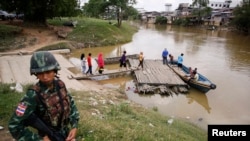Thai government talks with separatist groups in Southern Thailand have been broadly welcomed in a bid to end a decade of violence that has claimed thousands of lives. Rights activists see the negotiations as being at an early stage of a long process.
The talks in the Malaysian capital of Kuala Lumpur have been backed by the Malaysian government and mark a fresh attempt by Thai authorities to end a more than decade-long insurgency in southern provinces.
Previous talks have failed in part because the insurgent factions have been divided. But there has been more optimism since several groups formed an umbrella organization, Patani Consultative Council, or Mara Patani, with the aim of trying to achieve a “just, comprehensive and sustainable solution.”
The talks by Thailand’s military come after earlier efforts lapsed under the ousted former government of Prime Minister Yingluck Shinawatra.
A government advisor, Panitan Wattanayagorn, a political scientist, said the Thai government’s focus is to bring peace and stability to the region after a decade of conflict and mark a major step forward.
“It’s more systematic, more organized, more order; although certain issues are more or less the same [as in the past] but you have new participants and you have a more dynamic or more commitment. It’s a very good restart,” said Panitan.
Historically, the region was a semi-independent sultanate until 1909 when it came under Thai control through an agreement with Britain.
But over the past hundred years insurgent activity has ebbed and flowed amid Thai government efforts to assimilate the people into the kingdom.
In the late 1980s, a process of talks, arrests and amnesty led to a marked decline in insurgent violence for several years.
But under Prime Minister Thaksin Shinawatra’s administration from 2001, the government altered long standing security arrangements that led to an escalation in bloodshed since 2004.
The death toll has steadily climbed to over 6,000 people as insurgents targeted state officials, teachers, Buddhist monks and Muslims while local communities complained of extrajudicial killings amid a climate of impunity.
The violence included drive-by shootings, beheadings and bombing campaigns in key townships near the border with Malaysia.
Mara Patani representative Abu Hafez, said the group’s ultimate goal was sovereignty and the right of self determination.
Thai negotiators have consistently refused any calls to grant regional autonomy. But the military in the past year has moved to early release of some insurgent prisoners as a sign of goodwill.
Panitan said the talks are only at a very early stage.
“There’s no formal acknowledgment or no formal work on this particular meeting until further down the road. This is just a beginning process but it sends a positive signal to the process that indeed the two sides are committed to talks. And we hope in the near future more meetings can be organized and participation can be increased,” he said.
Angkhana Neelapaichit, a member of the National Human Rights Commission, said the negotiations indicated there is “some movement” especially with several insurgent groups attending. But Angkhana said for talks to succeed, it will require broader local community representation.
“My concern is that it must not [just] be representatives from the separatist groups but it must have the civil society, the people including the Buddhists, and women on the peace process because the final decision on the negotiation cannot be only be the state - we have to include more stakeholders,” said Angkhana.
The Thai military is taking steps in calling on insurgents to end violence, but have so far offered few concessions in return. Analysts say the insurgent groups are likely to extend the talks over the term of the military government until general elections are expected in 2017, with the hope for greater concessions from an incoming civilian government.







